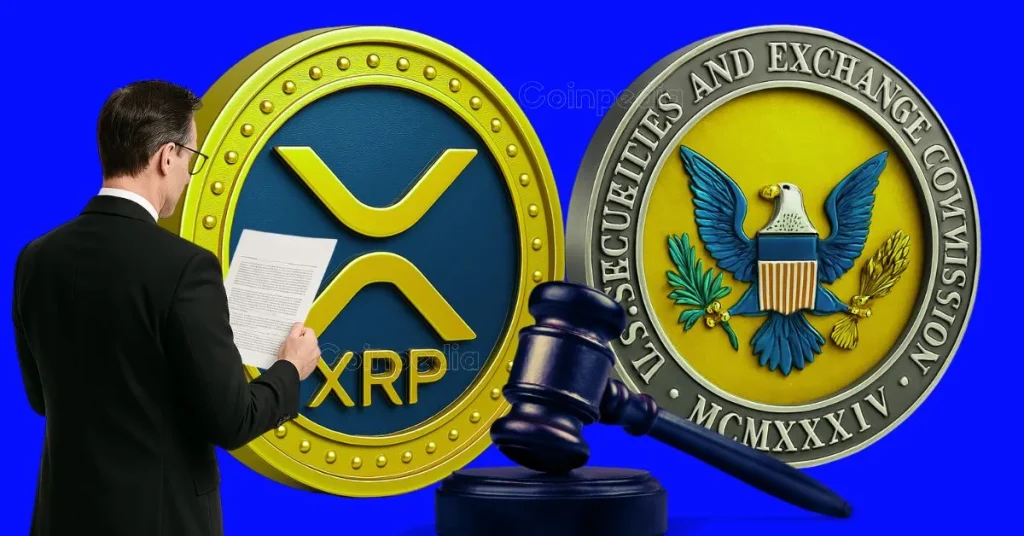Sam Bankman-Fried’s pardon odds rise to 10% on Kalshi after Trump pardons CZ, sparking renewed debate over political influence in crypto legal outcomes.Sam Bankman-Fried’s pardon odds rise to 10% on Kalshi after Trump pardons CZ, sparking renewed debate over political influence in crypto legal outcomes.
Sam Bankman-Fried Pardon Odds Hit 10% on Kalshi After CZ Clemency From Trump
2025/10/26 02:20
Sam Bankman-Fried’s pardon odds rise to 10% on Kalshi after Trump pardons CZ, sparking renewed debate over political influence in crypto legal outcomes.
Disclaimer: The articles reposted on this site are sourced from public platforms and are provided for informational purposes only. They do not necessarily reflect the views of MEXC. All rights remain with the original authors. If you believe any content infringes on third-party rights, please contact service@support.mexc.com for removal. MEXC makes no guarantees regarding the accuracy, completeness, or timeliness of the content and is not responsible for any actions taken based on the information provided. The content does not constitute financial, legal, or other professional advice, nor should it be considered a recommendation or endorsement by MEXC.
Share Insights
You May Also Like

What the U.S. shutdown tells us about market resilience
The post What the U.S. shutdown tells us about market resilience appeared on BitcoinEthereumNews.com. During the U.S. federal government shutdown that began on October 1, 2025, the Securities and Exchange Commission (SEC) went into contingency staffing mode. Almost a hundred crypto ETF decisions got stuck in approval limbo as a result, and key economic-data releases from agencies such as the Bureau of Labor Statistics and the U.S. Census Bureau were paused. For crypto, that blackout became an unscripted stress test, as the industry suddenly lost its usual regulatory support elements. And given that the crypto market often prides itself on being decentralized and self-sufficient, this is a moment of truth where it can prove that claim. How do crypto traders, exchanges, and issuers perform when oversight suddenly vanishes? Let’s take a look. What Actually Pauses in a U.S. Shutdown: ETF and token-filing reviews: Routine processing of ETF and token registration documents is largely suspended, as reflected by the SEC announcement. Issuer communications: Many correspondence channels between the SEC and registrants are inactive during the shutdown. Federal data releases: Reports such as jobs, inflation, and trade data are delayed, per Census Bureau and Bureau of Labor Statistics notices prior to the shutdown. A Pause in Oversight, Not in Action The shutdown didn’t just stop new rules; it halted everything that gives the market structure and visibility. And with enforcement activity slowing to a crawl, that leaves crypto issuers, exchanges, and traders navigating the silence on their own terms. For issuers, it’s an exercise in patience. There’s nothing to do but wait. Projects with pending ETF or token applications simply can’t move forward, no matter how ready they may be. Bureaucratic timeouts don’t discriminate — they hit all momentum equally. Exchanges, meanwhile, are keeping steady. The more experienced ones understand that running smoothly during a regulatory blackout is the best insurance policy. If anything goes wrong…
Share
2025/10/26 12:03

Ripple News: Trump’s CFTC Nominee Has History on XRP’s Side, Here’s Why
The post Ripple News: Trump’s CFTC Nominee Has History on XRP’s Side, Here’s Why appeared first on Coinpedia Fintech News President Donald Trump’s choice of Mike Selig to lead the U.S. Commodity Futures Trading Commission (CFTC) has drawn praise across the financial sector and the crypto community, especially among Ripple and XRP supporters. Selig, a lawyer and former CFTC official, is known for his detailed analysis of digital asset regulation. In a post on X, …
Share
2025/10/26 12:26

The First Ever Spot XRP ETF To Be Approved In The US Just Hit A Major Milestone
The post The First Ever Spot XRP ETF To Be Approved In The US Just Hit A Major Milestone appeared on BitcoinEthereumNews.com. The First Ever Spot XRP ETF To Be Approved In The US Just Hit A Major Milestone Sign Up for Our Newsletter! For updates and exclusive offers enter your email. Scott Matherson is a leading crypto writer at Bitcoinist, who possesses a sharp analytical mind and a deep understanding of the digital currency landscape. Scott has earned a reputation for delivering thought-provoking and well-researched articles that resonate with both newcomers and seasoned crypto enthusiasts. Outside of his writing, Scott is passionate about promoting crypto literacy and often works to educate the public on the potential of blockchain. This website uses cookies. By continuing to use this website you are giving consent to cookies being used. Visit our Privacy Center or Cookie Policy. I Agree Source: https://bitcoinist.com/the-first-ever-spot-xrp-etf-to-be-approved-in-the-us-just-hit-a-major-milestone/
Share
2025/10/26 12:02